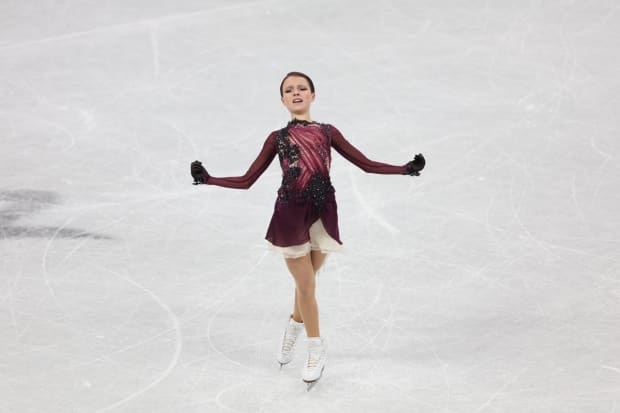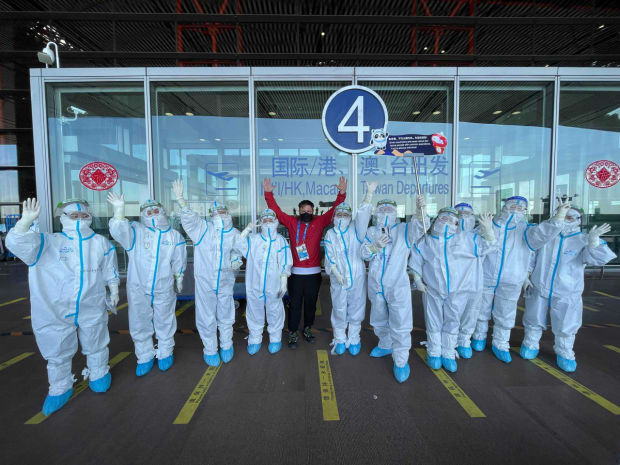BEIJING — After 17 days of competition—and controversy—across Beijing and the surrounding areas, the 2022 Winter Olympics have come to an end. On Sunday evening in China, the Closing Ceremony took place at the Bird’s Nest, marking the official end of the second pandemic-era Games in six months. Below, Sports Illustrated’s team of writers give their final takeaways from Beijing, where the sporting competition and Olympic spirit was undoubtedly overshadowed by doping accusations, ongoing disputes and rising geopolitical tensions.

George Walker IV/USA TODAY Sports
This was a hard two weeks for people who want to believe in the value of the Olympics. There have been so many reasons to feel discouraged: The ever-present pandemic that closed us off completely from the people of Beijing. The genocide that the host country's government pretends it is not committing. The level of surveillance and authoritarianism that means that athletes and journalists alike were issued burner phones. The corruption that allowed a perennial cheater to compete here in slightly different uniforms. The imminent war threatened by that same country.

Simon Bruty/Sports Illustrated
Somehow, the athletes always manage to redeem this enterprise, with soaring performances and raw emotion. But this time, the emotion I will most remember is that of the women's figure skaters on Thursday, when gold-medal favorite Kamila Valieva, competing under a cloud of doping suspicion, faltered in her free skate and rewrote the standings. Anna Shcherbakova, the 17-year-old who ended up with gold, sat stunned and alone. Alexandra Trusova, the 17-year-old who got silver, sobbed and threatened to retire on the spot because her historic program had not been enough to win. And Valieva, 15, crumpled, her chest heaving, her dreams shattered. What are we doing to these children?
Is any of this worth it? I think it still can be. But we need to rethink how we do this. —Stephanie Apstein
A talent agent is sitting in an office. The president of the world's most powerful sports governing body walks in. “All right,” the agent says. “Let’s see what you can do.”
What follows is an unbridled, unmatched display of impressive individual achievement. A figure skater executes five flawless quadruple jumps as “Rocketman” blares. A snowboarder rumbles over ramps and rollers to conquer personal demons. A Black speedskater makes history a mere five years after first stepping onto ice. Female bobsledders break gender barriers. Legends take their curtain calls. Skiers soar through the air, performing death-defying stunts. A record number of out LGTBQ athletes are enabled to showcase their pride on a global stage.
“But wait!” the president exclaims. “There’s more!”

Erick W. Rasco/Sports Illustrated
What follows is an unbridled, unmatched display of disgusting institutional failure. A cross-country skier is selected to light a cauldron, whitewashing accusations of genocide against her people. A tennis star is trotted out for a photo op before again vanishing from the public eye. A skeleton racer begs for a nation, whose systematic doping is being punished by nothing more than a name change, to not invade his homeland. Fake snow siphons water from a depleted region. Athletes sob in isolation. A coach is enabled to abuse her star figure skater, a child, on a global stage.
Nodding, the agent says, “So what do you call yourselves?”
And the president replies, “The Olympics!” —Alex Prewitt
This is the third straight Olympics in Asia, and each featured oppressive weather: incredible cold in the mountain cluster in PyeongChang, Korea; oppressive heat in Tokyo; subzero temperatures in Zhangjiakou, China. It had a real effect on the competition, which meant it was an unavoidable part of the story. As climate change continues to wreak havoc on the planet, the Olympics might serve as a biannual showcase of extreme weather.
This is not the primary message the International Olympic Committee wants to send to the world, but it can’t avoid it. Some prominent Olympic athletes are involved in Protect Our Winters, an organization trying to combat climate change, and hopefully more sign on. The future of so much more than the Winter Olympics is at risk. —Michael Rosenberg







